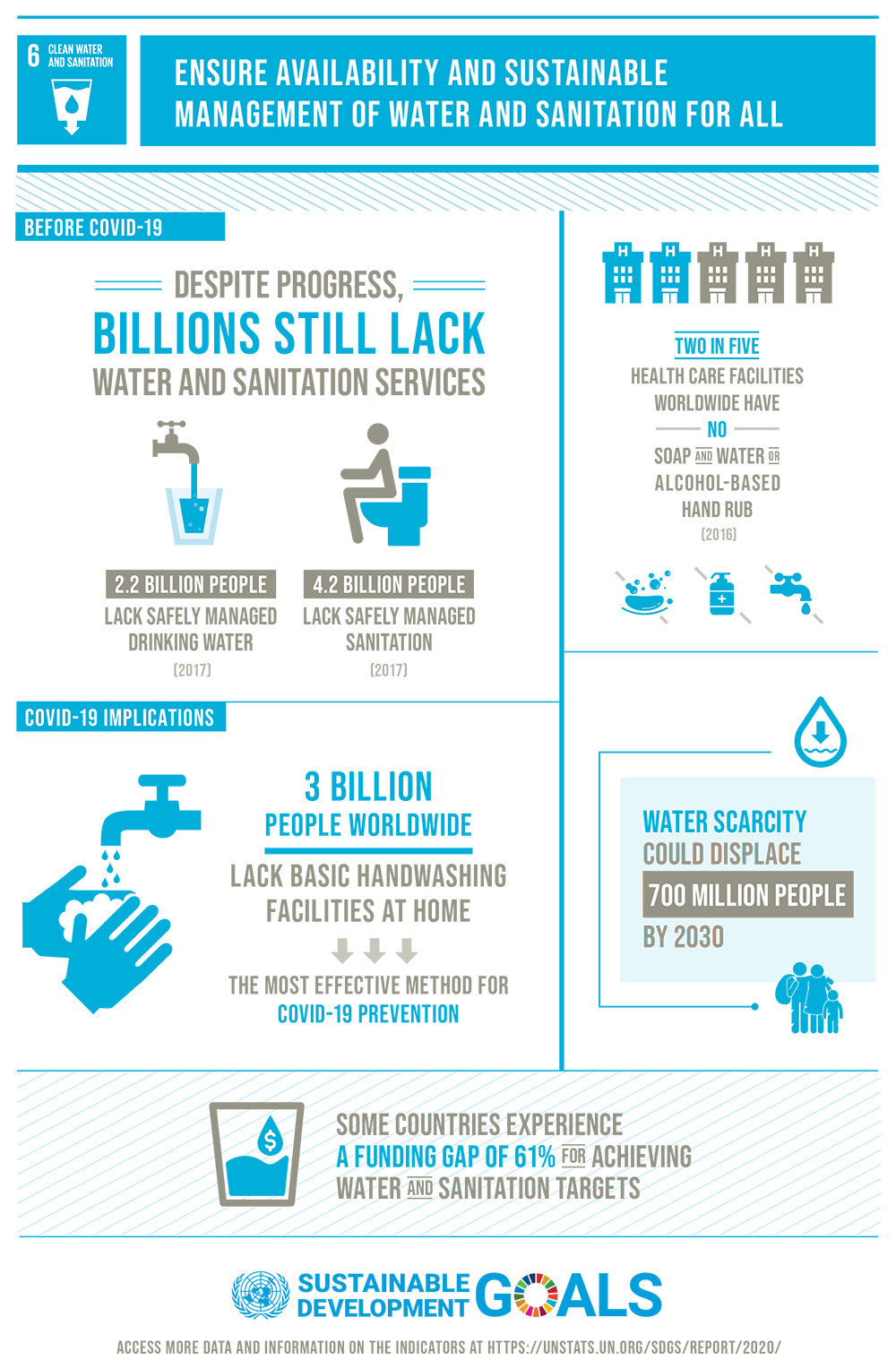Why is this important
Clean water and sanitation is a basic need for humans’ survival and endurance and thus should be accessible to everyone. Water is a major source of life and is necessary for survival. Sanitation helps curb the spread of diseases and infections, while also promoting good health and well being. Access to such important spheres for sustenance is a basic human right.
According to UNDP approximately 70% of the world’s water is utilised for agricultural purposes and 22% for industrial purposes. This stands to prove the importance of water in economic growth and productivity. However, UNDP observes that water shortage affects approximately more than 40% of the world population, and stated from an MIT study that more than half of the world population or one in every four people will reside in water stressed regions.
This water shortage is due to the population growth and demand for water outweighing the current water source and rate of replenishment. Many nations face issues related to this in the form of water pollution, depleting water ecosystems etc.
As per the Sustainable Development Goals Report-2020, 2.4 billion people still don’t have access to toilets, out of which 800 million practice open defecation. This increases the chances for onslaught of different diseases. Unsafe water and lack of sanitation causes infant mortality of 1000 children per day.
Water availability and proper sanitation lead to alleviation of poverty and food security. It also corrects imbalances within ecosystems, and provides a foundation for education, human rights and peace that could otherwise be threatened due to water scarcity. To ensure water security and sanitation, better infrastructure and availability of sanitary facilities is required.

Understanding the root cause for
Water shortage arises from exploitation and over-usage of water sources for unnecessary purposes, as well as pollution of water bodies and disturbance of water ecosystems that causes issues with groundwater replenishment etc. Sanitation issues arise from an unequal distribution of sanitation facilities and lack of investment in adequate infrastructure to ensure the same.
Lack of access or availability of the same in remote areas further deteriorates the overall health of the respective regions. Waste water generation exceeds the rate of waste water treatment, further causing a shortage of water, not only in its originally sourced form, but also in its recycled form.
As per Sustainable Development Goals Report-2020 it is seen that climate change and water is linked, as droughts generally exacerbate water and increase water scarcity. This adversely impacts health and productivity in a negative manner. However, as the study states, proper provision of sustainably sourced safe water and sanitation facilities is one of the climate mitigation strategies.
Lack of clean water and sanitation also gives rise to water borne diseases and spread of diseases. The World Health Organization has stated that hand washing is one of the most effective actions you can take to reduce the spread of pathogens and prevent infections. But, billions of people, that is at least one in every three people don’t even have access to it.
Changemakers fighting for clean water and sanitation
Clean water and sanitation is a basic human right and thus has various organizations working diligently to ensure the access to the same for all people. UN Water is a body of the UN, focused solely on the access, distribution, conservation and treatment of water across the globe. Water.org is another organization that works on a global scale to ensure access to safe water, and curb and prevent water crises. Sanitation and Water for All (SWA) is a global partnership of civil society institutions, NGOs, governments, private sector, research institutions and other stakeholders as hosted by UN agencies, for the purpose of eliminating inequalities observed in the fulfillment of human rights to water and sanitation. World Water Council is an internationally focused think tank which formulates strategies and policies for sustainable, secure and fair management of water resources.
What youth can do as a TAL transformer
Civil society organizations and government initiatives are essential to bring policy level changes for penetration of sanitation facilities and access to water. Including vulnerable groups into water resource management also ensures a fair and equitable distribution of resources.
What you as a transformer for the society can do, is use social advocacy, philanthropy and entrepreneurial/business ideas in an innovative manner to provide a progressive direction for reaching the goal. Instances of which are as follows:
Social Advocacy-
- Generating awareness regarding the role of indigenous women in water resource management
- Legal awareness of human rights catering to water and sanitation
- Spread knowledge regarding necessity of access of sanitation
Social Philanthropy-
- Investing in water research and development
- Financial aid for creating channels of distribution of water
- Financial support for penetration of sanitation facilities
Social Entrepreneurship
- Water research and innovation for efficient utilization and distribution of water
- Develop technologies for efficient water usage in industrial activities
- Efficient water usage and waste water treatment
References
United Nations (2020). The Sustainable Development Goals Report 2020. New York: United Nations, Department of Economic and Social Affairs. Retrieved from https://unstats.un.org/sdgs/report/2020/
https://www.undp.org/sustainable-development-goals#clean-water-and-sanitation
Sustainability Program Manager
